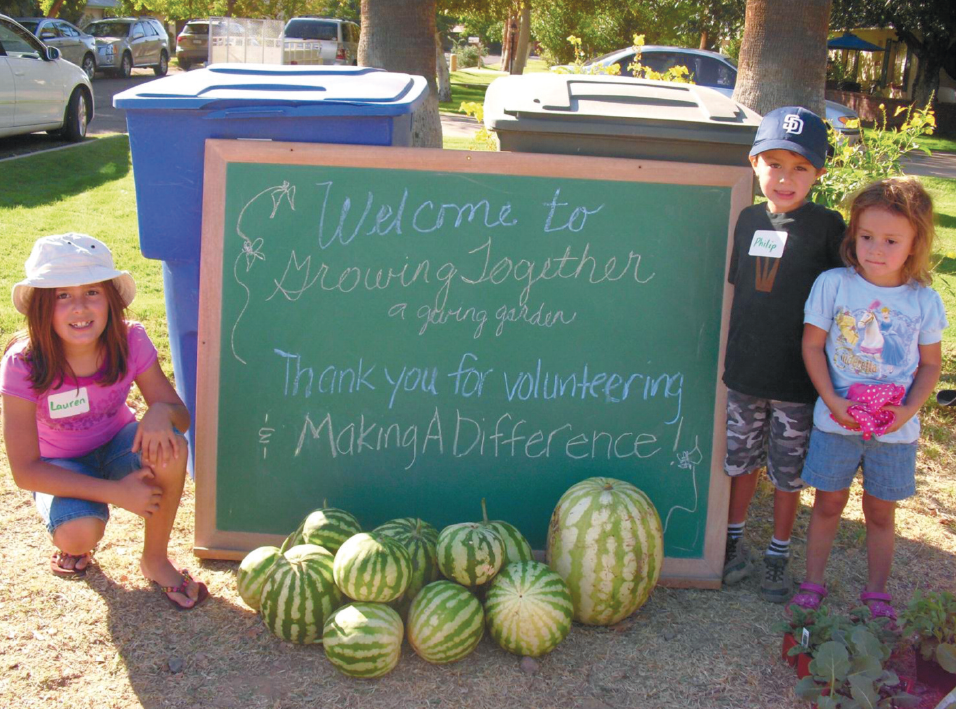Start A Community Garden
I drive west down Glendale Avenue toward Central Avenue in Phoenix several times a week, apparently in an oblivious fog because I only recently noticed what looked like a lush vegetable garden on the corner of Second Street and Glendale Avenue. Huh? A big vegetable garden on a busy urban street?
My curiosity piqued, I pulled around the block to read the sign, "Growing Together . . . a giving garden." I got onto the Internet as soon as I returned home and learned something new: Growing Together is a part of a flourishing community garden movement.
According to the American Community Gardening Association, a community garden is "any piece of land gardened by a group of people." The garden can be urban, suburban or rural. It can be at a school, a place of worship, a hospital or a vacant lot. The crops can be grown for those who work the garden, or sold, or given away to charitable organizations for distribution to community residents in need.
Some gardens charge a rental fee for plots; others do not. Some gardens, like the Glendale Avenue one, have nonprofit status that allows them to receive donations of goods, services and money to sustain the garden. Each garden is unique and set up according to the community's needs, interests and goals.
In these tough economic times community gardens are sprouting up all over.
Discovering this one reminded me that back in the day there was a shop called Garden Territory at The Farm at South Mountain. The shop was a learning venue owned by some very forward-thinking Arcadia women who were interested in sustainable agriculture long before that became a trendy term.
I took several stimulating weekend courses at Garden Territory, but the most gratifying and memorable was a gardening workshop. Each of the participants was given a small plot of dirt, a handful of seeds, a hoe and a shovel. After a short lecture on growing vegetables in the desert, we set out to plant a small vegetable garden.
I planted broccoli, arugula, lettuce and baby bok choy along with my new gardening friends from the workshop. I visited my plot a few times a week, weeding and watering and praying over the fledgling seeds. My hard work was rewarded with the freshest, most delicious, abundant produce.
It was an educational experience. It was a healthy experience. Most of all, though, it was a joyful experience–especially when my garden mates were also there working on their pieces of earth.
I will always have fond memories of sharing the space with other like-minded people; spending breezy Sundays and hot and humid days as well, weeding, pruning and sharing gardening tips with my new friends.
I didn't know it at the time but that was my introduction to community gardening.
Indeed, it was the "community" nature of it that offered me more than just a plateful of fresh veggies.
For Doreen Pollack, executive director of Valley Permaculture Alliance, that's exactly what community gardens should provide. Of course, the crop is important but building community is equally important.
Ronda Cronin, local Realtor and Master Gardener and part of the core group who started Growing Together, would agree.
Whenever Ronda sees a vacant lot, she thinks there should be something growing on it. She approached the owners of the Glendale lot with the idea to start a charity community garden on the property. A core group of five planned together for a full year before they began working the land.
The plots at Growing Together are not individually owned but shared by everyone who volunteers to take care of them. The majority of the produce is donated–over 1,000 pounds of food was given to three local charities after the spring/early summer harvest just this year.
Over 125 people volunteer at the garden. "Most of them just appear," says Cronin. Some are local neighborhood people. Others are people down on their luck willing to help with the work for a small donation of food.
"It's true community spirit. I've met new people I might never have otherwise met. Even kids enjoy themselves so much that they keep coming back to help," says Ronda.
The Boy Scouts and Girl Scouts have gotten involved. The young adults need community projects to earn their badges, and gardening qualifies. They're helping to build the fence that will soon surround the garden. In true community spirit, however, people have not poached the produce in the garden. As far as Ronda knows, no one has taken anything from the garden without permission even though it has been unfenced and unguarded.
Community gardens are found in upscale urban neighborhoods like North Central Phoenix as well as in less affluent areas. According to Jane Pearson, director of programs for St. Luke's Health Initiative, "In many low-income neighborhoods where there might have been crime associated with vacant land, the transformation of a lot into a thriving mini-farm has created a community point of pride and resulted not only in food being available but also making the neighborhood safer for the residents."
So you want to start a community garden?
1. Are you interested in improving your health and the health of your neighbors?
2. Would you like to work side by side with people who value producing their own food?
3. If you feel stressed at the end of your workday, do you think that pulling weeds and growing food might help to ease some of that stress?
4. Is there a vacant piece of land in your neighborhood that could use sprucing up?
5. Have you been thinking of growing fruits and veggies in your yard but you just don't know how to get started?
6. Would you like to make a closer connection to your neighbors?
7. Have you been thinking how you might work to reduce hunger in Arizona?
8. Do you believe that fresh is best?
If you answered yes to these questions, a good place to start is the ''So You Want to Start a Community Garden?" sessions offered by the Valley Permaculture Alliance under the auspices of St. Luke's Health Initiatives (slhi.org). An introduction to what community gardening is all about, participants learn what's needed to get started: how to find the land, how to deal with liability and insurance issues, as well as setting up rules and regulations concerning finances, watering, work schedules, etc.
Contact: Valley Permaculture Alliance at 602-325-1230
Additional resources:
American Community Gardening Association
From Neglected Parcels to Community Gardens: a Handbook
Community Garden Toolkit
Growing Together





